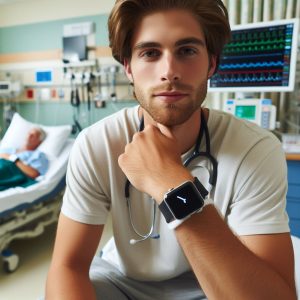In the context of emerging technologies in healthcare, doctors face several professional risks, including the potential for job loss and the risk of their skills becoming outdated. Let’s explore these risks in detail:
- Job Loss due to Automation and AI:
- Example: Diagnostic fields such as radiology and pathology are seeing rapid advancements in AI. Algorithms can now analyze medical images and pathology slides with increasing accuracy. For instance, an AI system developed to read X-rays or MRI scans might outperform or work much faster than a human radiologist, potentially reducing the demand for radiologists to perform these routine analyses.
- Impact: While AI is unlikely to completely replace doctors, certain tasks within their roles may be automated. This could lead to a decreased need for doctors in certain specialties, or a shift in the job market where fewer positions are available for tasks that AI can perform efficiently.
- Skills Becoming Outdated with Technological Advancements:
- Example: The rapid evolution of medical technology, such as new surgical techniques, robotic surgery, or advanced genetic therapies, requires doctors to continually update their knowledge and skills. A surgeon who is not trained in the latest robotic surgery techniques might find their skills less relevant as these technologies become more prevalent.
- Impact: Doctors need to engage in continuous learning and adapt to new technologies to ensure their skills remain relevant. Failure to keep up with these advancements can result in their expertise becoming less valuable or in demand. This continuous learning requirement can be challenging, especially for established professionals who must balance this with their existing clinical responsibilities.
- Increased Legal and Ethical Complexities:
- Example: The use of AI in patient diagnosis and treatment raises new legal and ethical questions, such as liability in case of a misdiagnosis made by an AI system. Who is held accountable – the doctor who used the AI tool, the hospital, or the developers of the AI system?
- Impact: Doctors must navigate these new legal landscapes and understand the ethical implications of using advanced technologies in their practice. This adds an additional layer of professional risk, as the legal framework for AI in healthcare is still evolving.
- Dependence on Technology and Loss of Traditional Skills:
- Example: With increasing reliance on technology for diagnostic and treatment decisions, there’s a risk that doctors may become overly dependent on these tools, potentially leading to a decline in traditional diagnostic skills or clinical judgment.
- Impact: This dependence can be risky if the technology fails or is unavailable, requiring doctors to rely on their clinical judgment and skills, which may not be as sharp if they are underused.
- Pressure to Adopt New Technologies:
- Example: There may be institutional or peer pressure on doctors to adopt new technologies, even when they are not fully comfortable or trained in their use. This could lead to errors or a decrease in the quality of patient care.
- Impact: Doctors face the challenge of integrating new technologies into their practice at a pace that allows for safe and effective patient care, without succumbing to external pressures.
In summary, while technology brings significant advancements and efficiencies to healthcare, it also presents unique challenges and risks to doctors. Balancing the adoption of new technologies with continuous learning, ethical considerations, and maintenance of traditional clinical skills is crucial in navigating these changes.
Riskiest Medical Streams
Certain medical streams are at a higher risk of job loss or significant changes in their traditional roles. These include:
- Radiology and Imaging: This field is particularly susceptible to the impact of AI and machine learning technologies. AI algorithms have shown remarkable proficiency in interpreting medical images such as X-rays, MRIs, and CT scans. This could potentially reduce the demand for radiologists’ interpretive skills, as machines become more efficient at these tasks.
- Pathology: Similar to radiology, AI’s ability to analyze and interpret complex patterns in pathological slides can impact the traditional role of pathologists. Automated systems are increasingly used for initial screenings or even detailed analyses, potentially reducing the need for manual examination by pathologists.
- General Practice: With the advent of AI-driven diagnostic tools and health advice apps based on symptoms, there’s a possibility that patients might opt for these technologies for initial health consultations. This could impact the demand for face-to-face consultations with general practitioners, especially for routine health issues.
- Pharmacy: Automated dispensing systems and AI in pharmaceutical research could streamline many processes in pharmacy, potentially reducing the need for pharmacists in traditional dispensing roles. However, the role of pharmacists in patient counseling and drug therapy management might still protect against significant job loss.
- Medical Transcription: The role of medical transcriptionists is already being significantly impacted by advances in voice recognition and AI-driven transcription services. These technologies can transcribe medical reports and patient information with increasing accuracy, potentially reducing the need for human transcriptionists.
- Administrative Roles in Healthcare: Many administrative tasks in healthcare, such as patient scheduling, billing, and record-keeping, can be automated through advanced software systems, potentially reducing the need for staff in these roles.
Safest Medical Streams
These fields generally involve complex human interactions, high levels of personalized care, or specialized skills that are challenging to automate. Here are a few examples:
- Psychiatry and Mental Health: The field of mental health requires a deep understanding of human emotions, empathy, and the ability to navigate complex interpersonal dynamics, which are difficult to replicate with AI or automation. Therapeutic relationships in psychiatry rely heavily on personal interaction, making this field more resilient to automation.
- Pediatrics: Pediatric care involves not just medical expertise but also a deep understanding of child behavior, developmental stages, and the ability to communicate effectively with children and their parents. The nuanced care required in pediatrics is less susceptible to automation.
- Geriatrics: Similar to pediatrics, geriatric medicine involves caring for an aging population with specific needs. It requires a holistic approach to care, considering multiple chronic conditions, psychological aspects, and social factors that are difficult to automate.
- Surgical Specialties: While robotic surgery is on the rise, the role of the surgeon involves complex decision-making, adaptability, and manual dexterity that are currently beyond the capabilities of automated systems. Specialized surgical fields, especially those requiring intricate and complex procedures, are less likely to be fully automated.
- Palliative Care and Hospice Medicine: This field focuses on providing care for patients with serious illnesses and involves not just medical care but also emotional support, pain management, and helping patients and families navigate difficult decisions. The empathetic and holistic approach required in palliative care is difficult to replicate with technology.
- Medical Specialties Involving Complex Diagnostics: Specialties such as rheumatology, endocrinology, and some subspecialties of internal medicine involve complex diagnostics and treatment plans that are often personalized to each patient, making them less prone to automation.
- Emergency Medicine: The unpredictable nature of emergency medicine, requiring quick decision-making in high-stakes situations, is a challenging environment to automate. While technology can aid in diagnostics and treatment, the critical decision-making in emergency settings largely relies on human expertise.
- Obstetrics and Gynecology: This field involves a combination of surgical procedures and personalized care, including childbirth, which is a complex and unpredictable process requiring human decision-making and adaptability.
It’s important to recognize that while these fields may be less susceptible to automation, technology will still play a significant role in enhancing the practice of medicine across all specialties. Adaptation to new tools and continuous learning remain key for all medical professionals, regardless of their specialty.

